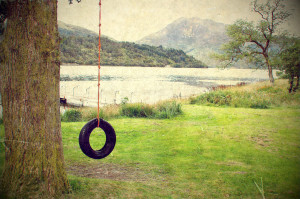submitted by jwithrow.
Journal of a Wayward Philosopher
The Majesty of Childhood
January 29, 2015
Hot Springs, VA
The S&P opened at $1,993 today. Gold is down to $1,271 per ounce. Oil is back down to $44 per barrel. Bitcoin has drifted to $225 per BTC, and the 10-year Treasury rate opened at 1.75% today.
Systemic risk in the global economy seems to be growing. The Swiss National Bank recently announced a target interest rate range of -1.25% to -0.25%. The Gnomes of Zurich must have gone into hiding. Now Singapore has announced its intent to pursue a form of easing (money-printing) in order to slow the appreciation of the Singapore dollar. No one seems to want a currency that maintains purchasing power anymore – welcome to fiat bizarro world! It would be wise to have at least 10% of your capital in physical gold and silver bullion at this point.
Moving on…
Childhood is a magical experience full of awe, wonder, excitement, and purity. Children have no paychecks to earn or mortgage payments to make. They have no investment portfolios to monitor or insurance policies to structure. They may find it to be pretty, but children could not care less about what’s happening in the gold market. With no degrees, certifications, specializations, or political experience to speak of children are completely tuned out to any implication of status; they seem to understand innately that all people are endowed with individual rights that should not be violated. Children naturally expect to be treated with honesty and dignity which is why they so often use phrases like “But you said…” or “But that’s not fair…”.
Free from these trappings, children are able to live wholly in the moment. Several Eastern philosophies hold up that very state – living wholly in the present – as the highest ideal and many hours are devoted to meditation, yoga, and other techniques designed to train the mind to be still in the present. Children are able to perfectly achieve this present mindfulness without expending any effort or energy whatsoever. This is why children will enthusiastically collect pebbles and sea shells. Adults deem these objects worthless but children are able to appreciate them for their own natural beauty and uniqueness.
Children are almost entirely self-referential until we train them to submit to arbitrary rules and restrictions. Children gain fulfillment and satisfaction from their own accomplishments, no matter how minor, with little need for external incentives and motivations. I suspect this is what Jesus of Nazareth meant when he said “Truly I tell you, unless you change and become like little children you will never enter the kingdom of heaven.”
The truth is all children are born with an inner brilliance and an indomitable will. Children are natural-born learners and their thirst for understanding is unquenchable. Childhood curiosity is unmatched as children want to know the ‘why’ for everything. A child’s mental activity is through the roof!
As we discussed last month in our entry about raising children in the modern world, modern society extinguishes curiosity and subverts individual will by institutionalizing learning and imposing harsh external expectations upon children. Simply put, hierarchy is not natural to children. By enforcing a strict hierarchal structure chock full of arbitrary rules and regulations, modern schools drown the majesty of childhood in wave after wave of contradictory authoritarianism.
On the one hand we talk endlessly about freedom and independence but then we herd our children into compulsory schools that regiment their entire day with mandatory classes and their evening with mindless homework. How can the child be free and independent if he has no time for his own interests? We tell our children that every individual is special but then we tell them they must raise their hand and ask for permission to go to the restroom. That doesn’t make the kid feel particularly special. We encourage our children to play together in cooperation but then we punish them if they try to communicate with their neighbor in the classroom. What’s the kid to make of this?
Of course we justify all of this by saying the children need to learn to follow the rules and obey authority. We never make the distinction between natural rules such as “do not steal” and arbitrary rules such as “do not go to the bathroom without a hall pass”. Likewise we never make the distinction between “respect your parents” and “do not question your teachers”. This breeds a passive populace that will unquestioningly submit to all manner of arbitrary rules, regulations, licenses, restrictions, mandates, and taxes in adulthood as long as someone in “authority” issues them. Then you end up with dishonest money and a parasitic society.
I just can’t help but wonder… what if individuals with infinite potential were not automatically plugged in to institutionalized systems of compulsory education? What if more children were left free to learn in their own way on their own schedule? What if the majesty of childhood was not crushed by a regimented schedule and arbitrary rules as soon as the child reached a particular age? What if, instead of learning to hide their brilliance and subvert their will, children learned to be self-governing and self-driven?
Until the morrow,
Joe Withrow
Wayward Philosopher
For more of Joe’s thoughts on the “Great Reset” and the paradigm shift underway please read “The Individual is Rising” which is available at http://www.theindividualisrising.com/. The book is also available on Amazon in both paperback and Kindle editions.



